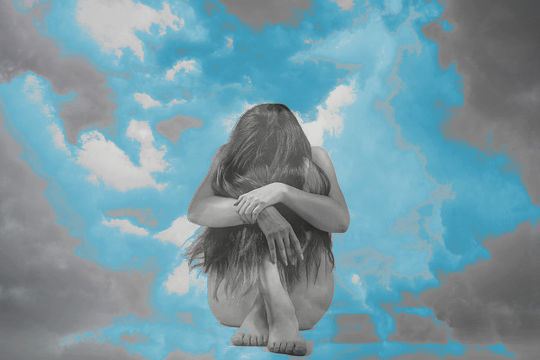
Image by Tumisu (colorized by InnerSelf.com)
Two doses of the psychedelic substance psilocybin, given with supportive psychotherapy, produced rapid and large reductions in depressive symptoms in a small study of adults with major depression, researchers report.
According to the study, most participants showed improvement and half of study participants achieved remission through the four-week follow-up.
A compound found in so-called magic mushrooms, psilocybin produces visual and auditory hallucinations and profound changes in consciousness over a few hours after ingestion. In a 2016 study, Johns Hopkins Medicine researchers first reported that treatment with psilocybin under psychologically supported conditions significantly relieved existential anxiety and depression in people with a life-threatening cancer diagnosis.
Overall, four weeks post-treatment, 54% of participants were considered in remission—meaning they no longer qualified as being depressed.
Get The Latest By Email
Now, the findings from the new study in JAMA Psychiatry, suggest that psilocybin may be effective in the much wider population of patients who suffer from major depression than previously appreciated.
“The magnitude of the effect we saw was about four times larger than what clinical trials have shown for traditional antidepressants on the market,” says Alan Davis, adjunct assistant professor of psychiatry and behavioral sciences at the Johns Hopkins University School of Medicine.
“Because most other depression treatments take weeks or months to work and may have undesirable effects, this could be a game changer if these findings hold up in future ‘gold-standard’ placebo-controlled clinical trials.”
The new findings cover only a four-week follow-up in 24 participants, all of whom underwent two five-hour psilocybin sessions under the direction of the researchers.
“Because there are several types of major depressive disorders that may result in variation in how people respond to treatment, I was surprised that most of our study participants found the psilocybin treatment to be effective,” says Roland Griffiths, professor in the neuropsychopharmacology of consciousness at the Johns Hopkins University School of Medicine and director of the Johns Hopkins Center for Psychedelic and Consciousness Research.
He says the major depression treated in the new study may have been different than the “reactive” form of depression in patients they studied in the 2016 cancer trial. Griffiths says his team was encouraged by public health officials to explore psilocybin’s effects in the broader population of those with major depressive disorder because of the much larger potential public health impact.
For the new study, the researchers recruited 24 people with a long-term documented history of depression, most of whom experienced persisting symptoms for approximately two years before enrolling in the study. The average age of participants was 39; 16 were women; and 22 identified themselves as white, one person identified as Asian, and one person identified as African American. Participants had to taper off any antidepressants prior to the study with the help of their personal physician to ensure safe exposure to this experimental treatment.
Thirteen participants received the psilocybin treatment immediately after recruitment and after preparation sessions, and 11 participants received the same preparation and treatment after an eight-week delay.
Treatment consisted of two psilocybin doses given by two clinical monitors who provided guidance and reassurance. The doses were given two weeks apart between August 2017 and April 2019 at the Johns Hopkins Bayview Medical Center Behavioral Biology Research Building. Each treatment session lasted approximately five hours, with the participant lying on a couch wearing eyeshades and headphones that played music, in the presence of the monitors.
All participants were given the GRID-Hamilton Depression Rating Scale—a standard depression assessment tool—upon enrollment, and at one and four weeks following completion of their treatment. On the scale, a score of 24 or more indicates severe depression, 17–23 moderate depression, 8–16 mild depression, and 7 or less no depression. At enrollment, participants had an average depression scale rating of 23, but one week and four weeks after treatment, they had an average depression scale score of 8.
After treatment, most participants showed a substantial decrease in their symptoms, and almost half were in remission from depression at the follow-up. Participants in the delayed group didn’t show decreases in their symptoms before receiving the psilocybin treatment.
For the entire group of 24 participants, 67% showed a more than 50% reduction in depression symptoms at the one-week follow-up and 71% at the four-week follow-up. Overall, four weeks post-treatment, 54% of participants were considered in remission—meaning they no longer qualified as being depressed.
The researchers say they will follow the participants for a year after the study to see how long the antidepressant effects of the psilocybin treatment last, and will report their findings in a later publication.
According to the National Institute of Mental Health, more than 17 million people in the US and 300 million people worldwide have experienced major depression.
About the Authors
Support for the study came from the Steven and Alexandra Cohen Foundation, Tim Ferriss, Matt Mullenweg, Craig Nerenberg, and Blake Mycoskie; as well as by grants from the Riverstyx Foundation and the National Institute on Drug Abuse.
Conflicts of interest disclosed to JAMA Psychiatry include the following: Johnson serves as a consultant and/or advisory board member for AWAKN Life Sciences Inc.; Beckley Psychedelics Ltd.; Entheogen Biomedical Corp.; Field Trip Psychedelics Inc.; Mind Medicine, Inc.; Otsuka Pharmaceutical Development & Commercialization, Inc.; and Silo Pharma, Inc.
books_herbs









